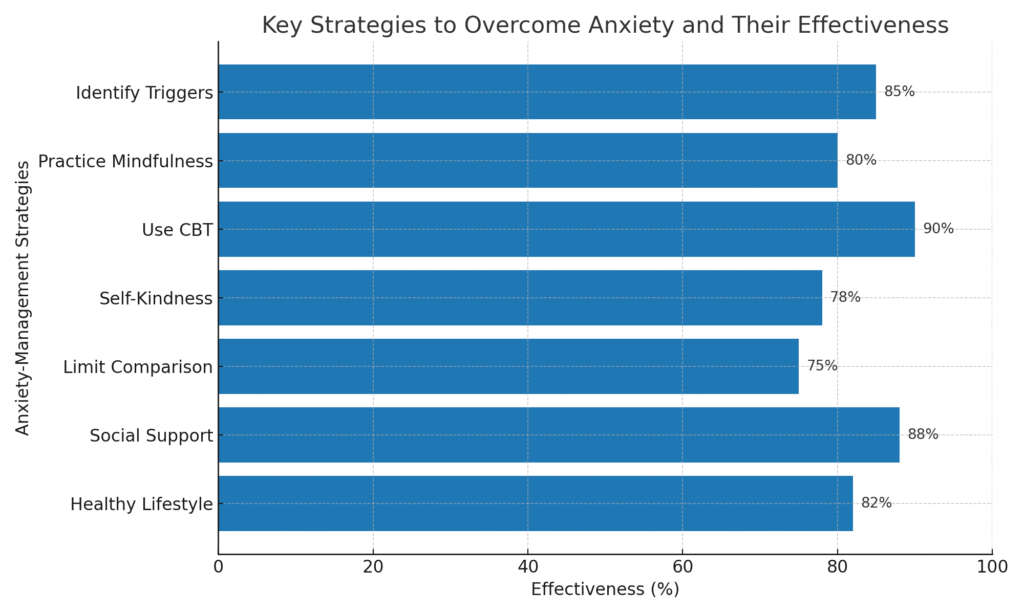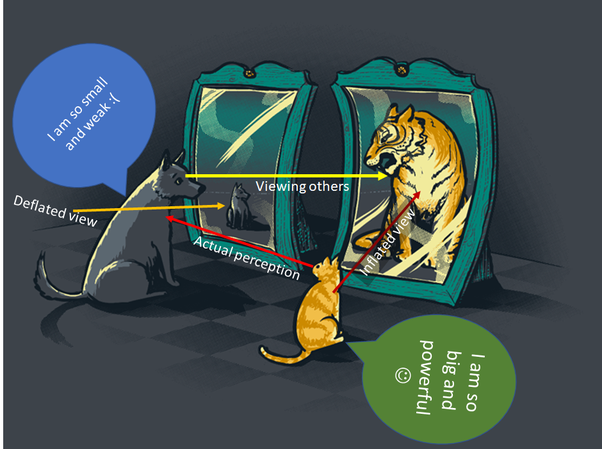If you think you are the only one facing anxiety issues, you are mistaken, because it’s a natural response that usually occurs due to internal or external stress. Feeling nervous, restless and tense are common symptoms of anxiety. It’s important to mention that you are not alone, as this is a common issue, but the key question is how to overcome anxiety. Overcoming anxiety is a simple process, and anyone can do it. Here, I’m going to share some practical, research-backed strategies that can really help you manage and overcome anxiety. So, let’s get started.
“The best use of creativity is imagination. The worst use of creativity is anxiety.” – Deepak Chopra

1. Understand Your Anxiety
If you want to overcome anxiety, then you’ve to figure out what is actually causing it, because it’s the first step to overcoming and managing it. Anxiety varies from person to person; it might be emotional or mental anxiety. So, first identify the actual reason by asking yourself: when do you feel it and what triggers it? Then try to pinpoint where it’s coming from, either from the workplace, relationships, health, or past experiences.
Once you understand it, you can respond to it accordingly, either by doing relevant exercises or using breathing techniques. For example, if you notice you become anxious before giving a presentation at work, you can prepare in advance, practice deep breathing and use positive self-talk to calm your nerves before starting presentation.
2. Challenge Anxious Thoughts
Challenging anxious thoughts is a powerful way to reduce anxiety and build emotional resilience. So ask yourself:
- Is this thought true?
- What evidence do I have for/against it?
- What would I tell a friend in this situation?
Cognitive Behavioural Therapy (CBT) is a widely used treatment for anxiety and is not specific to a certain age group. CBT helps an individual to figure out the negative thought patterns that are actually causing anxiety and provides users with practical tools to manage it. It equips individuals with the skills to change their thoughts and adopt more adaptive behaviour, ultimately reducing anxiety symptoms and improving overall well-being.
A 2023 meta-analysis found CBT effective for treating anxiety disorders among children and adolescents aged roughly 5–16 years(WikipediaScienceDirect). Another study concluded that approximately 60% of youth recover after CBT treatment (ScienceDirect+15Frontiers+15PMC+15).
3. Meditation
Let’s discuss another highly impactful strategy to overcome anxiety, which is called meditation. Meditation gives better control over your thought patterns and ultimately helps and ultimately helping to manage overthinking. It allows you to become aware of anxious thoughts without letting them put you under stress. If you start practicing mediation on regular basis, you will observe enormous change in your thinking process. You will become more aware of negative thoughts that lead to anxiety.
“Meditation can help us embrace our worries, our fear, our anger; and that is very healing. We let our own natural capacity of healing do the work.”- Nhat Hanh
4. Walk & Exercise
Walking and exercising are both incredibly effective tools for managing and controlling anxiety. Research shows that when you walk or exercise, your brain releases dopamine. Dopamine is basically feel-good chemical that help calm anxious thoughts and improve your overall mental health.
When you’re anxious, your thoughts often spiral through your mind. Walk or exercise basically switch your mind to another mode by giving you something else to focus that helps settle random thoughts. Even a short 10-15 minute walk can act like a reset button. Furthermore, anxiety often shows up in the body which lead to multiple issues like tight shoulders, clenched jaw and shallow breathing. Movement helps to Loosen up tense muscles and promote deeper, more relaxed breathing.
5. Healthy Lifestyle
Healthy Lifestyle plays a key role in managing anxiety. Consider it as a foundation, you can still use therapy or meditation if needed, but a healthy lifestyle supports everything you do. Lack of sleep, an unbalanced diet, and excessive alcohol and caffeine consumption can increase anxiety. So, establish a consistent sleep schedule and avoid mobile or TV screens before bed.
In addition, a balanced diet supports brain function, so drink enough water, minimize the use of sugar and caffeine, and avoid alcohol. The research has shown that individuals who maintain a consistent sleep schedule and consume a diet rich in fruits, vegetables, whole grains, and lean proteins are less likely to experience anxiety.
6. Talk It Out
If your feelings of anxiety are making it difficult to function, talk to others about it. You can talk to a mental health professional, your close friends, a mentor, or someone you trust the most because they might have a fruitful ideas you can try, or they might be able to point out something that has served as a trigger. But sometimes it’s nice to talk to someone who knows what it’s like to be in my shoes.
So by discussing your problem with others may helpful to cope up the anxiety. More broadly, psychological research supports the idea that having strong, healthy friendships and social support is crucial for mental well‑being and resilience, helping reduce stress and anxiety while promoting psychological health(BioMed Central+12apa.org+12Veryw).
7. Be Kind to Yourself
Being kind to yourself is actually one of the most powerful ways to manage and overcome anxiety. It sounds simple, but it makes a huge difference. Anxiety often comes with unrealistic expectations, and constant self-judgement. When you treat yourself with compassion during tough times, you bounce back faster. Self-kindness creates internal safety which ultimately loose the anxiety’s grip. So, acknowledge your feelings without judgement, do small comforting things and celebrate small wins.
For example, if you made a mistake at work, instead of replaying it in your head all day and criticising yourself, you could take a short break, remind yourself that everyone makes mistakes, enjoy a cup of tea, and note what you learned from it—turning a stressful moment into a self-care opportunity.”
8. Stop comparisons
Constant comparison makes you question your own worth: “Why am I not as successful, attractive, productive, smart, etc.?” This type of self-doubt eats away at your confidence and further fuels anxiety. In addition to this, when you focus so much on where others are, you forget where you started and how far you’ve come. This mindset shift causes pressure and stress, rather than self-encouragement. Comparison shifts your focus from growth to decline, and this shift creates a sense of urgency and fear which are the basic components of all anxiety.
A 2024 study of Chinese college students found that upward social comparison significantly predicted higher levels of social anxiety. This effect was mediated by rumination, thinking repeatedly about perceived shortcomings which intensified anxiety symptoms(SAGE Journals+7digitalcommons.lib.uconn.edu+7grandrisingbehavioralhealth.c).

Final Thought
Overcoming anxiety is not about eliminating it completely. It’s about learning how to understand it, manage it and prevent it from controlling your life. From identifying triggers and practicing mindfulness to embracing self-kindness, building social connections, and using evidence-based tools like CBT, every step you take strengthens your emotional resilience.
Remember, progress is not always instant, and it’s okay to have setbacks; what matters is your willingness to keep moving forward. Treat yourself with the same compassion you would offer a friend, focus on the small wins, and be patient with the process. Anxiety may be a part of your story, but it doesn’t have to be the author of it—you have the power to write a new chapter filled with calm, confidence, and control.
REFERENCES
https://www.healthline.com/health/anxiety/generalized-anxiety-disorder
https://www.healthline.com/health/how-to-calm-anxiety
https://www.medicalnewstoday.com/articles/how-to-treat-anxiety-without-medication
https://psychcentral.com/depression/how-to-deal-with-anxiety-and-depression
https://psychcentral.com/ptsd/dealing-with-trauma
https://psychcentral.com/depression/how-to-keep-going-through-depression
https://www.goodhousekeeping.com/health/wellness/a42396674/anxiety-quotes
FAQs
How to overcome anxiety without medication?
There are many ways to treat anxiety without medication. These methods include various types of therapy as well as dietary and lifestyle factors, such as reducing alcohol intake and getting regular exercise.
What is the best treatment for anxiety?
Professional treatment usually includes therapy and medication. Cognitive behavioral therapy (CBT) is particularly effective for anxiety. It helps people identify and change the thinking patterns that cause anxiety. Medications, such as selective serotonin re-uptake inhibitors (SSRIs) and benzodiazepines, may also be part of a treatment plan.
How can I cope with anxiety and depression?
Practice mindfulness and relaxation techniques Mindfulness techniques help reduce stress and promote a sense of calm by focusing your attention on the present moment, reducing anxiety and enhancing mood.



This was such a motivating read—thank you for sharing your experience and practical steps to overcome anxiety. I’ve also been working on managing my own anxiety, and one thing that’s helped me stay focused and calm is Ritalin 10mg, especially during overwhelming days. I usually order it online from Order Pharma USA: https://orderpharmausa.com/product/ritalin-mexican-10mg/. It’s been a supportive part of my routine.
Thank you for sharing your experience—glad you found the post helpful! Wishing you continued strength and calm on your journey.
Thank you for your sharing. I am worried that I lack creative ideas. It is your article that makes me full of hope. Thank you. But, I have a question, can you help me?